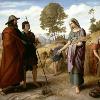

Tags: Shavuot View |
Tags: Shavuot View |
Tags: Shavuot View |
|||||||||
?????? or ?? ????? (Chag HaShavuot or Shavuot) nickname = English (English language): "Festival of Weeks" observedby = Judaism and Jews begins = 6th day of Sivan (or the Sunday following the 6th day of Sivan in the Karaite tradition) ends = 7th (in Israel: 6th) day of Sivan celebrations = Festive meals. All-night Torah study. Recital of Akdamut liturgical poem in Ashkenazic (Ashkenazi Jews) synagogues. Reading of the Book of Ruth. Eating of dairy foods. Decoration of homes and synagogues with greenery. type = Jewish significance = One of the Three Pilgrim Festivals. Celebrates the revelation of the Five Books of the Torah (Chumash (Judaism)) (or Old Testament of the Christian Bible (Bible#Christian canons of the Bible)) by God (Names of God in Judaism) to Moses and to the Israelites at Mount Sinai (Biblical Mount Sinai), 49 days (7 weeks) after the Exodus (The Exodus) from Egypt (Ancient Egypt). Commemorates the wheat harvesting in the Land of Israel. Culmination of the 49 days of the Counting of the Omer. relatedto = Passover, which precedes Shavuot
AudioHe-Shavuot.oggShavuot (or AudioYi-Shavuos.oggShavuos, in Ashkenazi (Ashkenazi Jews) usage; lang-he??????, lit. "Weeks") is a Jewish holiday that occurs on the sixth day of the Hebrew month of Sivan (late May or early June). Shavuot commemorates the anniversary of the day God (Names of God in Judaism#In English) gave the Torah to the entire Israelite nation assembled at Mount Sinai, although the association between the giving of the Torah (Matan Torah) and Shavuot is not explicit in the Biblical text. The holiday is one of the Shalosh Regalim, the three Biblical pilgrimage festivals. It marks the conclusion of the Counting of the Omer.
The date of Shavuot is directly linked to that of Passover. The Torah mandates the seven-week Counting of the Omer, beginning on the second day of Passover and immediately followed by Shavuot. This counting of days and weeks is understood to express anticipation and desire for the Giving of the Torah. On Passover, the Jewish people were freed from their enslavement to Pharaoh; on Shavuot they were given the Torah and became a nation committed to serving God.
In the Bible, Shavuot is called the Festival of Weeks (Hebrew: ?? ???????, ?ag ha-Shavuot, bibleverse-lbExodus34:22HE, bibleverse-lbDeuteronomy16:10HE); Festival of Reaping (Hebrew: ?? ?????, ?ag ha-Katsir, bibleverse-lbExodus23:16HE), and Day of the First Fruits (Hebrew ??? ???????, Yom ha-Bikkurim, bibleverse-lbNumbers28:26HE). The Mishnah and Talmud refer to Shavuot as Atzeret (Hebrew: ????, a solemn assembly), as it provides closure for the festival activities during and following the holiday of Passover. Since Shavuot occurs 50 days after Passover, Hellenistic Jews gave it the name Pentecost (??????????, "fiftieth day").
One thing that Shavuot is known for is being little-known. It is postulated that among other reasons, its obscurity is related to the gravitas of the Torah itself, with its numerous positive commandments and negative commandments.
According to Jewish tradition, Shavuot is celebrated in Israel for one day and in the Diaspora (Jewish diaspora) (outside of Israel) for two days. Reform Jews celebrate only one day, even in the Diaspora.
Holiday Name: Shavuot
Official Name: lang-he



